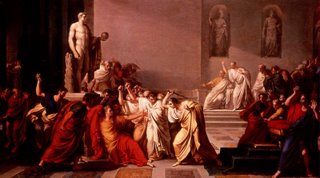March 15, the "Ides of March." A bad day to be an emperor, at least it was in 44 BC Rome.

In general, Julius Caesar was a masterful military and political leader, renowned for his conquest of Gaul (modern-day France, Belgium, Switzerland) . The trouble began when he was proclaimed "Dictator Perpetuus," or Dictator for Life. This sat particularly poorly with the Roman tradition of The Republic, which split political power among numerous Senators and, to a lesser extent, influential wealthy land owners called equites. So, rather predictably, they murdered him on the floor of the Senate. He was stabbed between 26 and 35 times, depending on which account you read. One of the conspirators was Marcus Brutus, Caesar's distant cousin and a testamentary heir. Shakespeare delighted to dramatize this historic event in his play, Julius Caesar, and breathed the famous words, "Et tu Brute?" into the emperor to make them his last. Shakespeare also gave new vernacular meaning to the ides of March (ides = middle), having Caesar visit a soothsayer before his imminent death who warned him, "Beware the Ides of March!" Obviously Caesar didn't follow his advice, whether it really happened or not.
When Caesar was assassinated on March 15 in 44 BC, Gaius Octavius was studying in Apollonia, in what is now Albania. When Caesar's will was read it revealed that, having no legitimate children, he had adopted his great-nephew as his son and main heir. By virtue of his adoption Octavius assumed the name Gaius Julius Caesar, and after a series of events too melodramatic even for daytime soaps, he defeated all of his rivals by 32 BC. He established a grand empire extending from Brittania to the Persian Gulf, and successfully began an age of relative peace, known as "Pax Romana," in an otherwise bellicose empire typified by warfare both civil and imperialistic.

But following the trend of everything else in the Universe since time began, the burgeoning Roman Empire eventually buckled under its own weight and collapsed back into chaos and unending civil wars.
Politics sure was more interesting in those days.
The lesson learned? "Friends may come and go, but enemies accumulate." - Thomas Young





